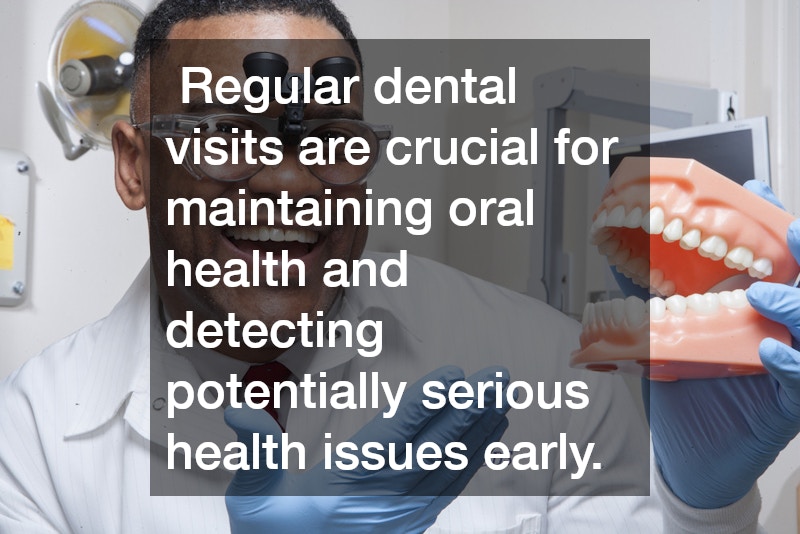
How Do Regular Dental Visits Prevent Oral Health Issues?
Early Detection of Oral Conditions
Dental professionals are trained to catch early signs of decay, gum disease, and other issues. Regular check-ups allow dentists to identify these conditions before they progress into more serious problems. With early detection, treatment can be administered more effectively, potentially preventing the need for more invasive procedures later on.
For instance, a cavity detected early can often be treated with a simple filling, whereas neglect could eventually lead to the need for a root canal or extraction. Early detection also plays a crucial role in identifying precancerous lesions in the mouth. This proactive approach is critical, as the chances of successful treatment increase significantly with early intervention.
Furthermore, attending regular dental check-ups can prevent minor issues from becoming painful and costly. Diseases such as gingivitis can be managed and even reversed if caught in time, thus emphasizing the importance of routine visits. In summary, seeing a dentist regularly helps maintain oral health while avoiding extensive and expensive treatment.
Professional Cleaning
Professional cleaning during dental visits helps remove plaque and tartar build-up in areas that are difficult to reach with regular brushing. Plaque that is not removed hardens into tartar, which can only be safely eliminated during a professional dental cleaning session. These cleanings not only leave your teeth feeling smooth and fresh but also help prevent cavities and gum disease.
Regular cleanings can also maintain and improve the aesthetic appearance of your teeth, which positively impacts confidence and social interactions. Tooth discoloration and surface stains—often unavoidable due to daily eating and drinking habits—are addressed during these sessions. Over time, teeth become more resistant to staining when they are cleaned and polished regularly.
The American Dental Association recommends visiting the dentist at least once every six months for a check-up and cleaning. Neglecting these visits can result in plaque turning into tartar, which contributes significantly to gum disease. Hence, frequent cleanings are essential for both cosmetic and health purposes.
Advice on Oral Hygiene Practices
During routine visits, dental professionals can offer personalized advice for improving brushing and flossing techniques. Many people are unaware that the pressure applied during brushing or the type of floss used can impact oral health. Personalized recommendations ensure that individuals are using the correct methods and tools for their specific dental needs.
Regular advice from a professional also keeps you up-to-date with advancements in dental care technology and products. They might suggest specialized toothbrushes, toothpaste, or even household natural remedies that suit your particular condition. This guidance ultimately enhances your ability to maintain dental health between office visits.
Tailored dental advice is especially valuable for individuals with braces, dental implants, or other orthodontic appliances. These tools necessitate unique cleaning processes that might not be obvious. Professional guidance helps circumvent common mistakes that could otherwise compromise the effectiveness of oral health routines.
What Are the Links Between Oral Health and Overall Health?
Connection to Heart Disease
Poor oral health is increasingly believed to contribute to the development of cardiovascular conditions. Bacteria from periodontal diseases can enter the bloodstream, causing arterial plaques to form and leading to heart inflammation. This increases the risk of life-threatening events such as heart attacks or strokes.
A study from the American Heart Association indicates that individuals with gum disease are nearly twice as likely to suffer from heart conditions. Furthermore, the connection between the two is supported by scientific findings, which show that inflammation caused by oral bacteria plays a role in such diseases. Regular dental check-ups are essential for mitigating this risk by treating gum disease effectively.
Dental visits ensure that your gums and teeth remain healthy, thus decreasing the amount of harmful bacteria entering your body. In essence, maintaining a healthy mouth significantly contributes to a healthy heart. This connection underscores the importance of dental care as a component of comprehensive health management.
Effects on Diabetes
Oral infections can severely affect blood sugar levels, complicating diabetes management. Individuals with diabetes are more susceptible to developing gum disease owing to their body’s reduced ability to fight infections. Conversely, untreated gum disease can make it difficult for diabetics to maintain stable blood sugar levels.
Regular dental visits help manage these interactions by ensuring early detection and proper treatment of gum disease. Understanding this two-way relationship between diabetes and oral health is critical for diabetics aiming to maintain balanced blood glucose levels. Early intervention and continuous care lessen the challenges of managing both oral health and diabetes.
Research has shown that treating periodontal disease leads to a reduction in systemic inflammation and improvements in blood sugar levels. This highlights the role of dental care as an integral component of diabetes management. For diabetic patients, maintaining oral health can directly aid in attaining overall health stability.
Impact on Respiratory Health
Inhaled bacteria from infected teeth or gums can contribute to lung infections and worsen existing respiratory conditions. This is particularly concerning in older adults or individuals with compromised immune systems. Regular dental check-ups lessen this risk by addressing oral infections before they influence respiratory health.
For patients with chronic obstructive pulmonary disease (COPD) or asthma, maintaining oral health is vital. Infections in the mouth can lead to exacerbations of these conditions, making breathing more difficult. The bacteria associated with gum disease have been linked to pneumonia, emphasizing the need for vigilant oral care.
Beyond the aesthetic benefits of a beautiful smile, regular dental visits are crucial for maintaining oral health and detecting potentially serious health issues early. Whether preventing dental problems or identifying links to other health concerns, these appointments play a vital role in overall wellness. The proactive management of oral and related systemic health issues underscores the value of dental care as a crucial component of holistic health practices.




